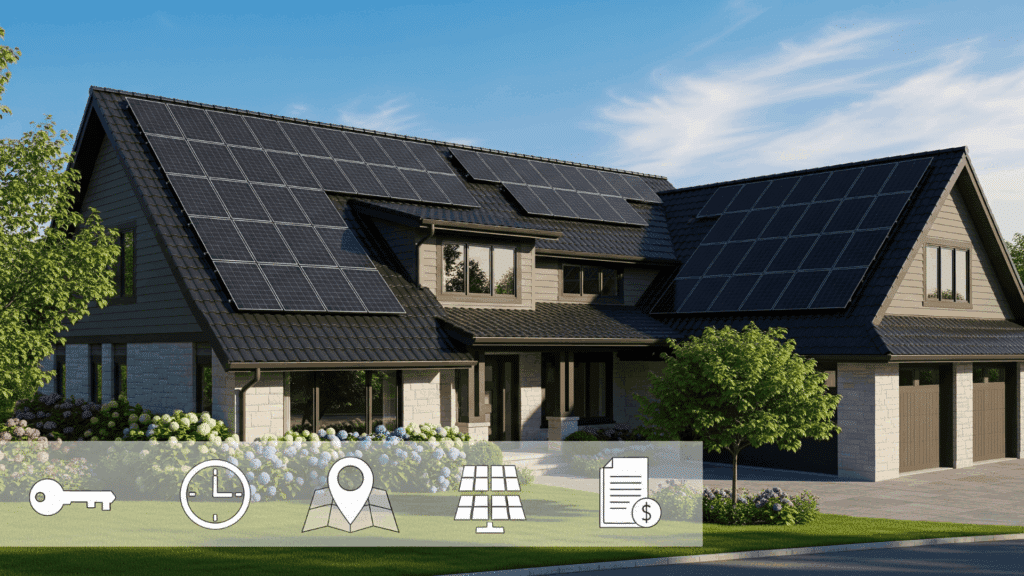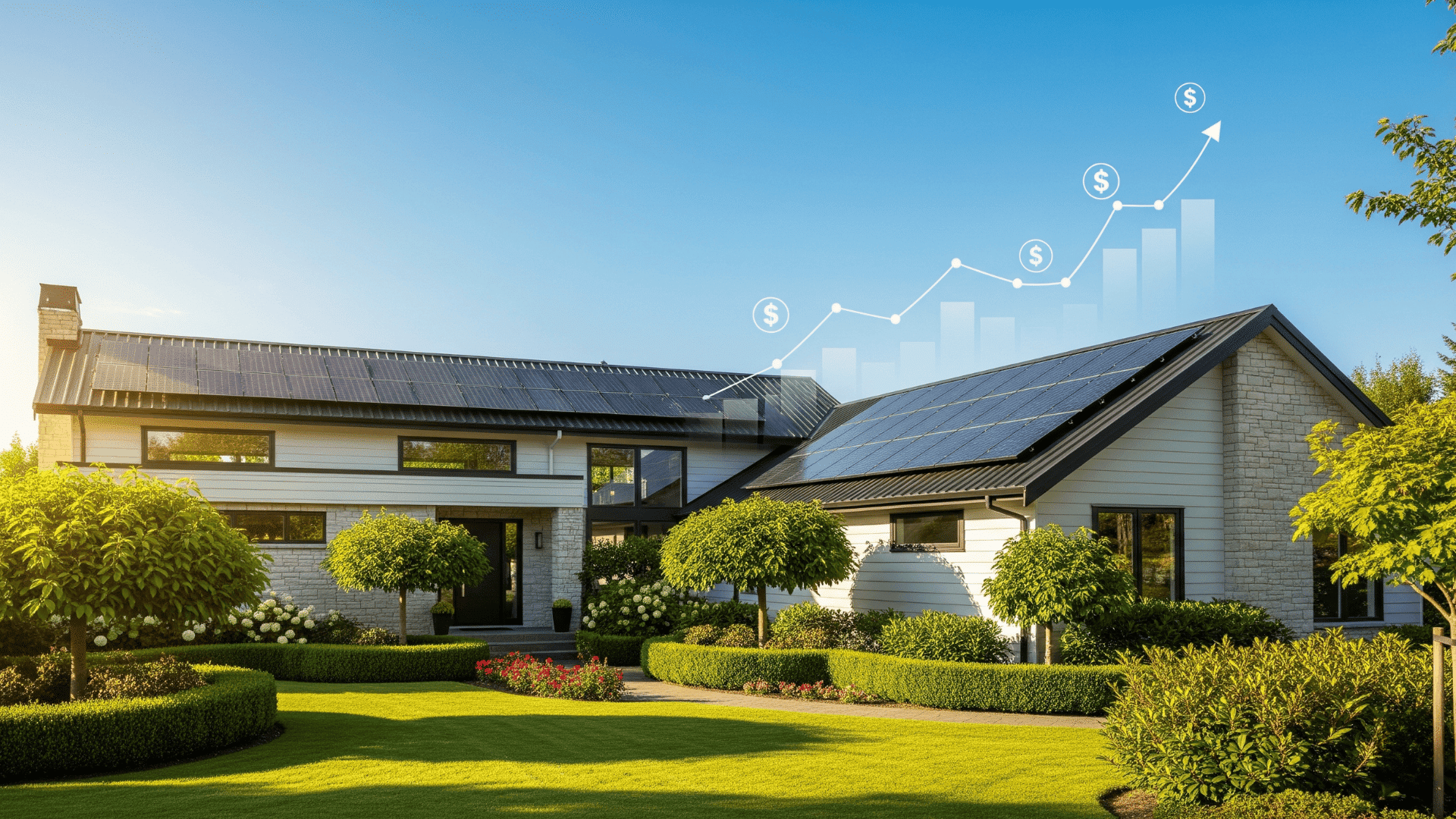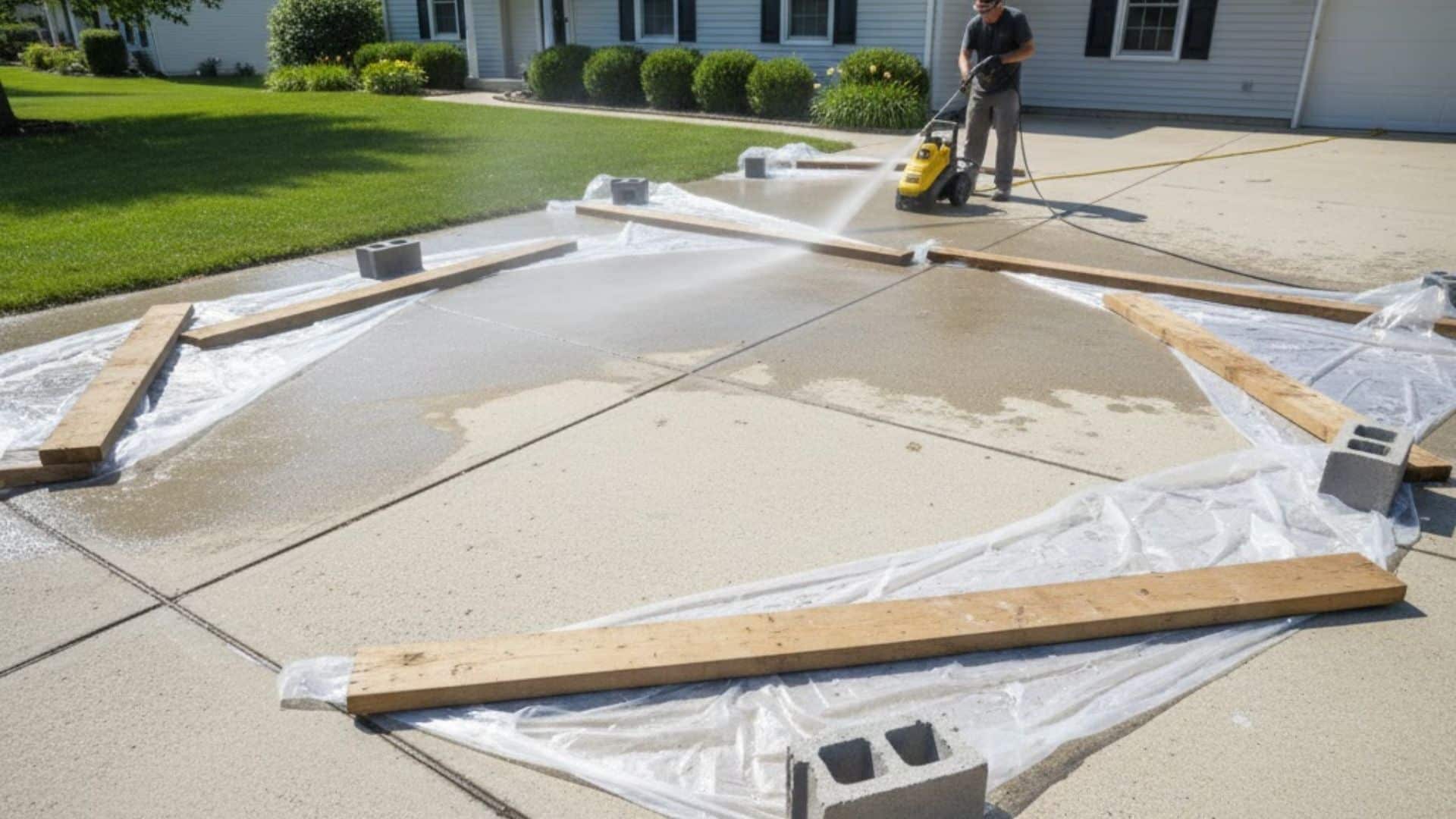The rising interest in solar stems not only from energy savings but also from its impact on home value.
When I think about if solar panels increase home value, it’s clear that solar panels make a home more attractive to buyers who are looking for long-term savings and sustainable features.
Homes with solar panels tend to sell faster and often fetch a higher price because buyers appreciate lower energy costs and a smaller carbon footprint.
While the exact boost in value depends on factors like location and system ownership, having solar panels installed generally adds real appeal and financial value to a property in today’s market. This makes solar a smart choice for homeowners looking to enhance their investment.
Understanding the Link Between Solar Panels and Property Value
Homeowners today see solar panels as more than just energy upgrades; they view them as smart investments that boost property value.
Energy efficiency plays a big role in the housing market, where buyers want homes that save money and lower their carbon footprint.
The appeal of lower utility bills combined with eco-friendly features strongly attracts modern buyers who prioritize sustainability and cost savings.
Real estate agents notice this shift too, often highlighting solar panels as a key selling point because they help homes stand out and sell faster. This growing awareness shows why solar is increasingly valued, not only for energy savings but also for its positive impact on home resale value.
Do Solar Panels Increase Home Value? Here’s Why
Solar panels add value to your house because they offer clear benefits that appeal to buyers. Energy savings are a top factor: lower utility bills and improved energy efficiency make homes with solar attractive.
Buyers appreciate the long-term cost reductions solar provides. Additionally, eco-conscious buyers see homes with solar panels as premium, sustainable properties, increasing their desirability.
Another important point is ownership: value increases mainly apply when homeowners own the solar system outright, rather than leasing or using third-party agreements. Ownership means buyers gain full benefits without contract complications, making the home more valuable and easier to sell.
Overall, solar panels combine financial savings, sustainability, and home appeal to boost property value effectively.
Solar Panel Value Impact: What the Data Reveals
Recent studies consistently show that solar panels significantly boost home values across markets. The data reveals strong returns on solar investments for homeowners planning to sell.
| Market | Study | Year | Value Increase | Dollar Impact Example |
|---|---|---|---|---|
| U.S. National | SolarReviews | 2025 | 6.9% | $29,000 (median home) |
| U.S. National | EnergySage | Recent | 5-10% | $39,500-$79,000 (CA home) |
| U.S. National | NerdWallet | Recent | 5-10% | $1,000 per $10,000 home value |
| New Jersey | HomeLight | Recent | 9.9% | Highest state premium |
| UK | Swansea University | 2024 | 6.1-7.1% | Strong international showing |
The evidence is clear: solar installations consistently add 5-10% to home values across major markets. For most homeowners, this translates to tens of thousands in additional sale value, making solar both an environmental and financial win.
What Affects Value Added by Solar Panels?

Increasing a home’s value with solar panels depends on multiple factors. Each plays a crucial role in how much buyers are willing to pay more. Beyond just installation, market dynamics, system specifics, and legal considerations, impact the perceived worth.
Understanding these elements helps homeowners make informed decisions about solar investments and future resale potential. Here’s a breakdown of the key influences:
1. Ownership Model
Ownership of the solar system is a major factor in value addition. Homes with owned solar systems usually see a boost in resale value because new buyers inherit a fully paid asset with no ongoing lease contracts.
Conversely, leased solar panels or systems under power purchase agreements often deter buyers due to transfer complications and extra monthly payments, which can reduce the sale price or slow market interest.
2. System Age & Condition
The age and condition of solar panels significantly affect their value contribution. Newly installed and well-maintained systems are more attractive, offering longer remaining life and better efficiency.
Older solar systems nearing the end of their lifespan or those with maintenance issues may lower appeal and, in turn, decrease added value. Efficient, updated technology is a premium selling point.
3. Location & Local Energy Costs
Where a home is located heavily influences the solar value impact. Markets with high electricity prices or strong solar policies tend to reward solar homeowners with greater value gains.
For instance, homes in sunny areas with expensive grid power see larger premiums. Meanwhile, regions with low electricity costs or limited solar incentives see modest or no added value from solar installations.
4. System Size
The size of the solar power system also matters. Larger systems generally produce greater energy savings, which translates to higher property value. Buyers see more considerable financial benefit with bigger installations that cover a larger portion of home energy needs.
Small or undersized systems provide less appeal, negatively impacting their value addition compared to more substantial setups.
5. Incentives, Tax & Appraisals
Tax incentives, rebates, and property tax exemptions can increase solar’s attractiveness and thus impact home value. However, any rise in property taxes triggered by solar installation may offset these gains unless exemptions apply.
Appraisers also factor in these elements when assessing value, influencing the final increase a solar system brings to a property’s market price.
Benefits Beyond Home Value
Solar panels offer benefits that go well beyond increasing property value, providing real advantages for homeowners and buyers alike. These advantages make investing in solar not only smart for resale but also for daily living:
- Utility Bill Reduction: Solar panels substantially lower electricity costs, providing long-term savings while homeowners live in the home.
- Federal and State Incentives: Homeowners can benefit from tax credits, such as the up to 30% federal solar investment tax credit available through 2025.
- Faster Sales: Homes with solar often attract more interest, standing out in the market and selling more quickly.
- Competitive Edge in Real Estate: Solar-equipped homes appeal especially to eco-conscious and cost-aware buyers.
- Sustainable Lifestyle: Solar supports reducing carbon footprints, appealing to buyers who value green living.
These benefits combine to make solar panels a highly valuable home improvement investment.
Drawbacks & Considerations
While solar panels offer many benefits, there are important drawbacks and considerations that homeowners should keep in mind before installation. Here are some things to keep in mind:
- Leased systems can reduce home value because potential buyers may be wary of taking over contracts and monthly payments, complicating sales.
- Property tax implications may arise as the added value from solar panels can increase property taxes unless tax exemptions apply.
- Appearance-related concerns affect some buyers who may not like the visible appearance of solar panels, making the feature less universally appealing.
- High upfront costs remain a barrier for some homeowners, despite long-term savings.
- System effectiveness depends on roof type, orientation, and shading, which can limit performance and value for certain homes.
Being aware of these factors helps set realistic expectations when investing in solar.
Final Thoughts
I now see that solar panels are a powerful way to add value to my home. Beyond energy savings, they make my property more attractive to today’s buyers who want sustainability and lower bills.
Owning the system fully unlocks the best resale benefits. While there are some upfront costs and visual considerations, the overall return can be significant.
Solar panels represent a smart investment that pays off in comfort, savings, and long-term financial gain. If ready to make a meaningful change for the future, considering solar panels could be the key to maximizing my home’s value and impact.
If this was helpful, check out other blogs on the website for more guides!








